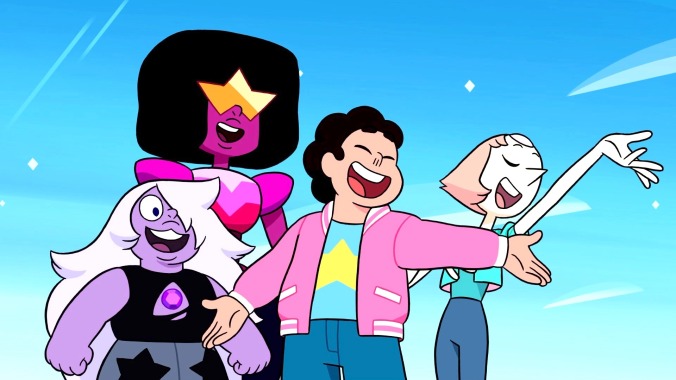Steven Universe: The Movie is melodious proof of a series still willing to grow

It would be easy to assume that Steven Universe—both the series and Earth’s young, bejeweled protector—has been everywhere and shown fans everything over the course of five seasons. After all, the events of the hour-long season 5 finale “Change Your Mind” cinched virtually all remaining loose ends and left behind a harmonious truce between Steven, the Crystal Gems, and the once-baleful Diamonds. With the planet tentatively out of harm’s way, Steven can finally kick off his flip-flops, hang out with Connie, and maybe begin to enjoy a life that isn’t inextricably tied to his mother’s confounding legacy. So naturally, it’s the perfect time for a gem harboring a grudge to surface, leaving Steven to once again grapple with the shards of a past that he is still struggling to fully understand. It’s a formula that fans are familiar with, and it renders the story vulnerable to certain repetition.
And yet, creator Rebecca Sugar and her team continue to work with a seemingly bottomless well of ingenuity, finding ways to circumvent complacency enough to still find new territory years later. Steven Universe: The Movie, a rollicking musical, revisits tried-and-true themes, like the power of love and friendship, finding strength in our ability to show empathy, and dealing with the past. This continuation, however, also explores the value in self-preservation and finding boundaries. Steven has always had his own way of fighting against dangerous, highly oppressive forces. This kind of opposition is new, and Steven quickly discovers that kind of peril will require an entirely new approach.
While time can be a natural enemy of any art, animation has always had the luxury of stagnancy—of which, up until now, Steven Universe has taken full advantage. The series addressed Steven’s ability to age in the season one episode “So Many Birthdays,” confirming that his body outwardly presents his authentic state of mind. Steven’s wide-eyed innocence has always justified his younger appearance, even in later seasons as he slowly began to unravel the mysteries Rose Quartz. But when we reunite with Steven, the Gems, and residents of Beach City two years after the events of “Change Your Mind,” Steven is older, more self-possessed, and more explicit about his needs. (And rejoice! Steven now has a shiny new neck!) Beach City has also undergone its own transformation as the Homeworld gems and humans have learned how to coexist. Change, to any degree, can become the death knell for any beloved property, yet Sugar and her team embrace the opportunity to move the story forward in every way, including in appearance. It may seem like the most logical choice, but it is still a choice—one that prevents the movie from feeling like just an extended episode, which tends to be the fate of similar adaptations. It’s also extremely considerate of Steven’s experience at this point: While he probably could have maintained his original form without the audience really batting an eyelash, Steven has simply seen, done, and processed too much to hold on to that same child-like wonder. He’s different, Beach City is different, the audience is certainly different, and Steven Universe has reached a place where acknowledging that shift is the only way to really push forward.
But sometimes moving forward means facing your past, and Steven remains in the unique position of dealing with the ramifications of his late mother’s choices. Some of his plight manifests in the film’s riveting artistic direction which, in spots, hearkens to the animation style of the late ’20s (the fun elements, that is, not so much the socially irresponsible bits)—an adorably clunky, spirited aesthetic that flies directly in the face of the story’s darker moments. Still, it fits within the context of this specific moment in Steven’s journey, and it’s a visual gift from a team that is still teeming with creativity. Some of that vintage charm spills into a few of the musical numbers—a blessing among a tonally gifted cast—and for a brief moment you can imagine how it would feel to see a modern story being told with the same lush fanfare of the musical films from the ’40s. It’s another instance of elements feeling so at odds, and yet it absolutely works.
The biggest takeaway from Steven Universe: The Movie is that many of us have to recalibrate what our idea of a happy ending looks like. Steven’s greatest desire is to return to Earth and revel in the mundane spoils of a teenager—hanging out with Connie, enjoying his free time, and not having to constantly defend humankind. As soon as trouble arrives, there is this sense that he is being robbed of the life he deserves and, in a way, he is. Steven has more than earned the right to pass the time away on the beach, plucking away at his ukulele in uninterrupted peace. But as he’ll soon learn, happy endings aren’t made up of a wrinkle-free existence, but of truly knowing the kind of peace and love worth fighting for.